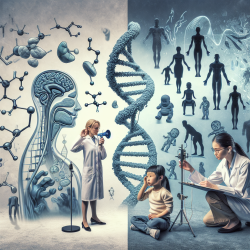Introduction
The study titled "SUCLA2 Arg407Trp mutation can cause a nonprogressive movement disorder – deafness syndrome" provides crucial insights into a rare genetic mutation affecting mitochondrial function. This research highlights the Arg407Trp mutation in the SUCLA2 gene, which is linked to a nonprogressive movement disorder and deafness syndrome. As speech-language pathologists, understanding the implications of such genetic conditions is vital for optimizing therapeutic outcomes for children affected by these disorders.
Key Findings
The research conducted by Alkhater et al. (2021) identifies the SUCLA2 Arg407Trp mutation as a cause of a nonprogressive movement disorder accompanied by deafness. This mutation affects mitochondrial succinate-CoA ligase, leading to disruptions in the Krebs cycle and mitochondrial DNA depletion. Although succinate supplementation can bypass the Krebs cycle block, it does not ameliorate the neurological symptoms.
Significantly, the study notes that early intervention with succinate supplementation might have potential benefits, although this requires further investigation. Importantly, the disorder is characterized by a stable clinical presentation from childhood into adulthood, which provides a unique opportunity for targeted therapeutic interventions.
Implications for Speech-Language Pathologists
For practitioners in the field of speech-language pathology, this research underscores the importance of early diagnosis and intervention. Here are several key takeaways:
- Early Identification: Recognizing symptoms associated with the SUCLA2 mutation, such as movement disorders and hearing loss, can facilitate timely referrals for genetic testing and diagnosis.
- Collaborative Care: Working closely with geneticists, neurologists, and audiologists is essential to develop a comprehensive care plan tailored to each child's needs.
- Customized Therapy Plans: Understanding the nonprogressive nature of the disorder allows speech-language pathologists to design long-term therapy plans that focus on maintaining and enhancing communication skills.
- Family Education: Educating families about the genetic nature of the disorder and the potential for stable symptomatology can help manage expectations and improve adherence to therapy.
Encouraging Further Research
The findings from this study open avenues for further research, particularly in exploring the potential benefits of early succinate supplementation. Speech-language pathologists are encouraged to stay informed about ongoing research and consider participating in interdisciplinary studies that aim to improve therapeutic strategies for genetic disorders.
Conclusion
Understanding the genetic underpinnings of disorders like the SUCLA2 Arg407Trp mutation is crucial for speech-language pathologists committed to providing data-driven, effective interventions. By integrating the latest research findings into practice, practitioners can enhance the quality of life for children with complex genetic conditions.
To read the original research paper, please follow this link: SUCLA2 Arg407Trp mutation can cause a nonprogressive movement disorder – deafness syndrome.










